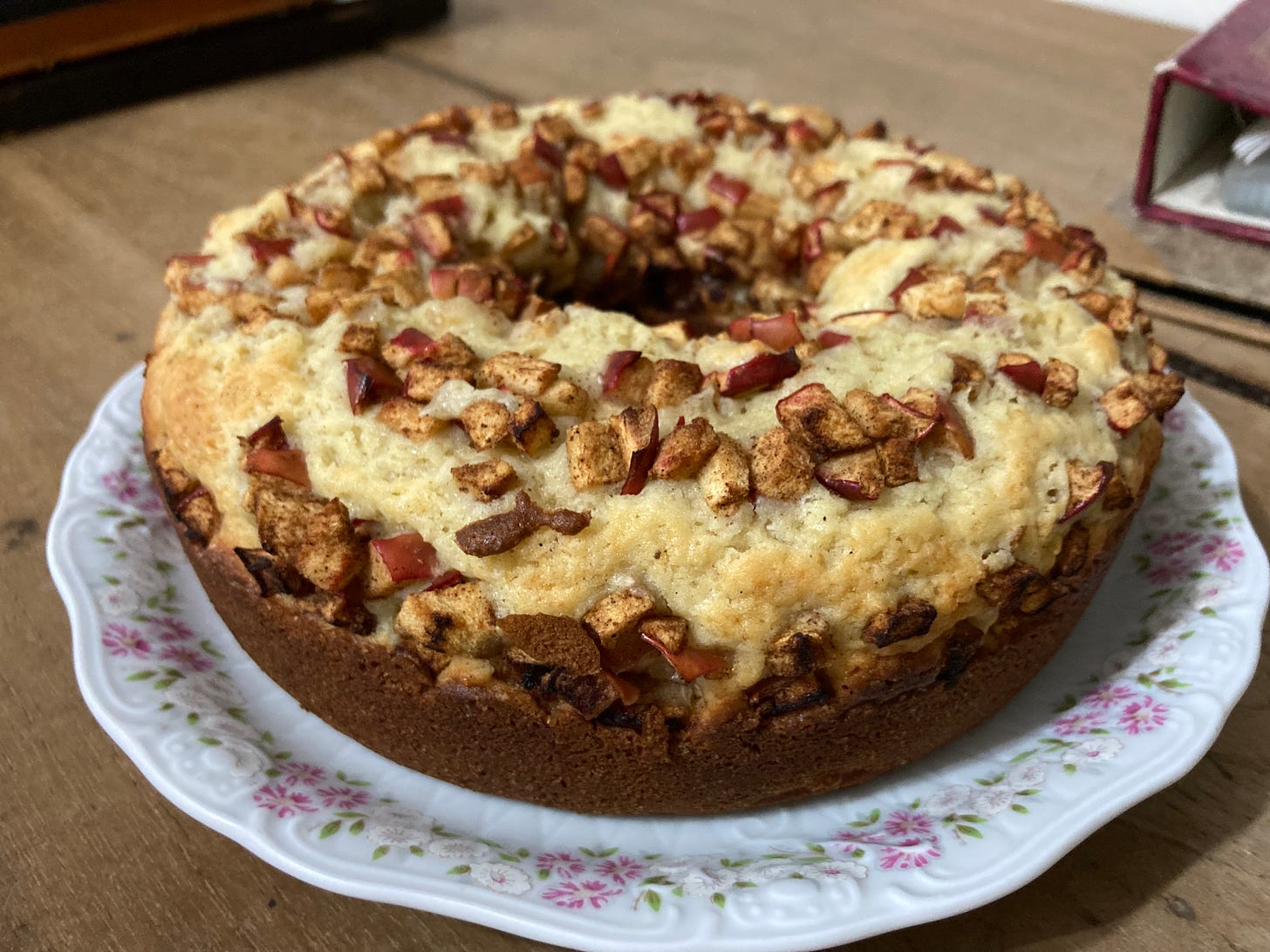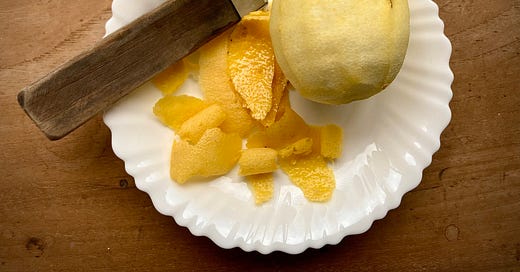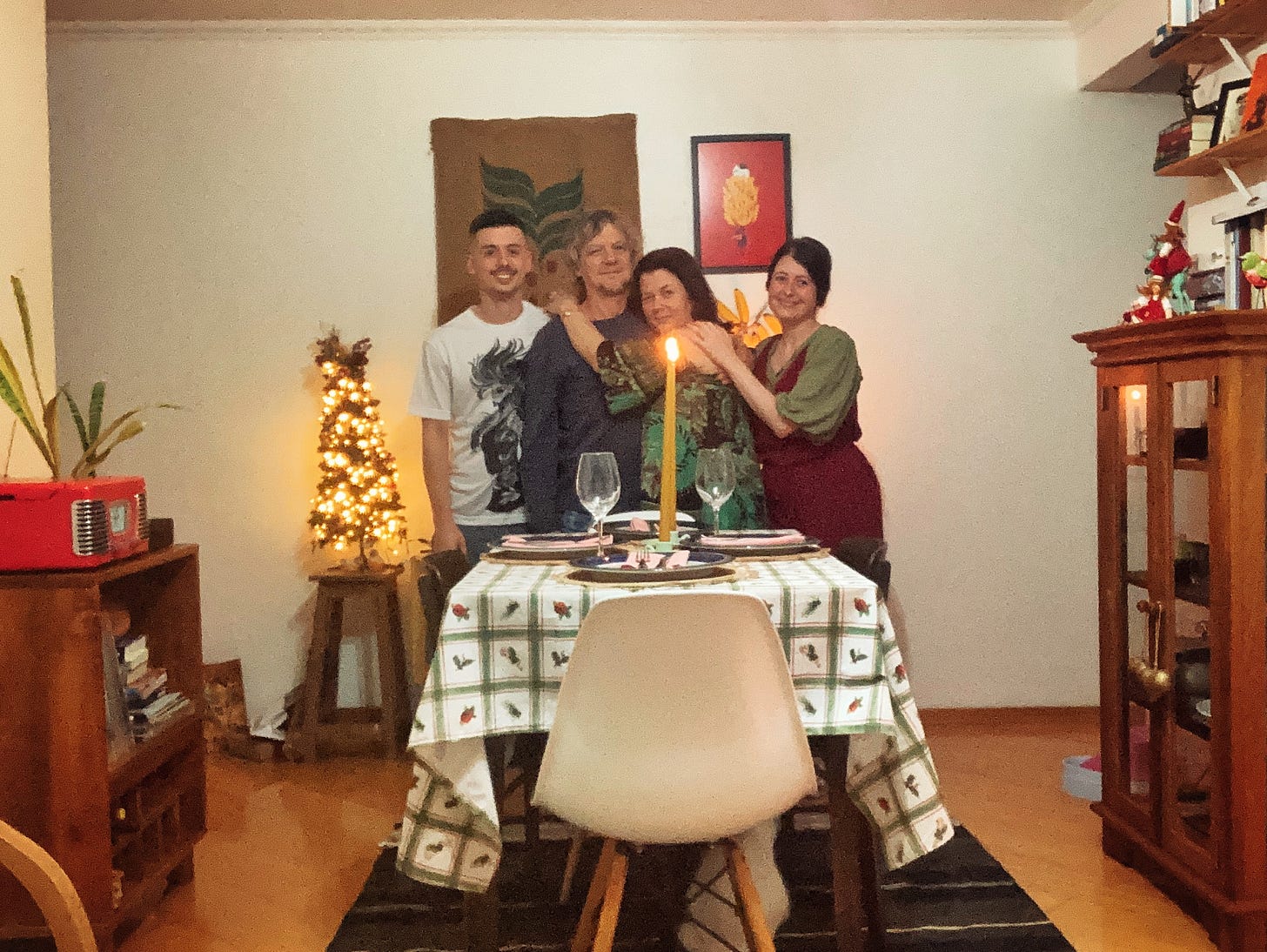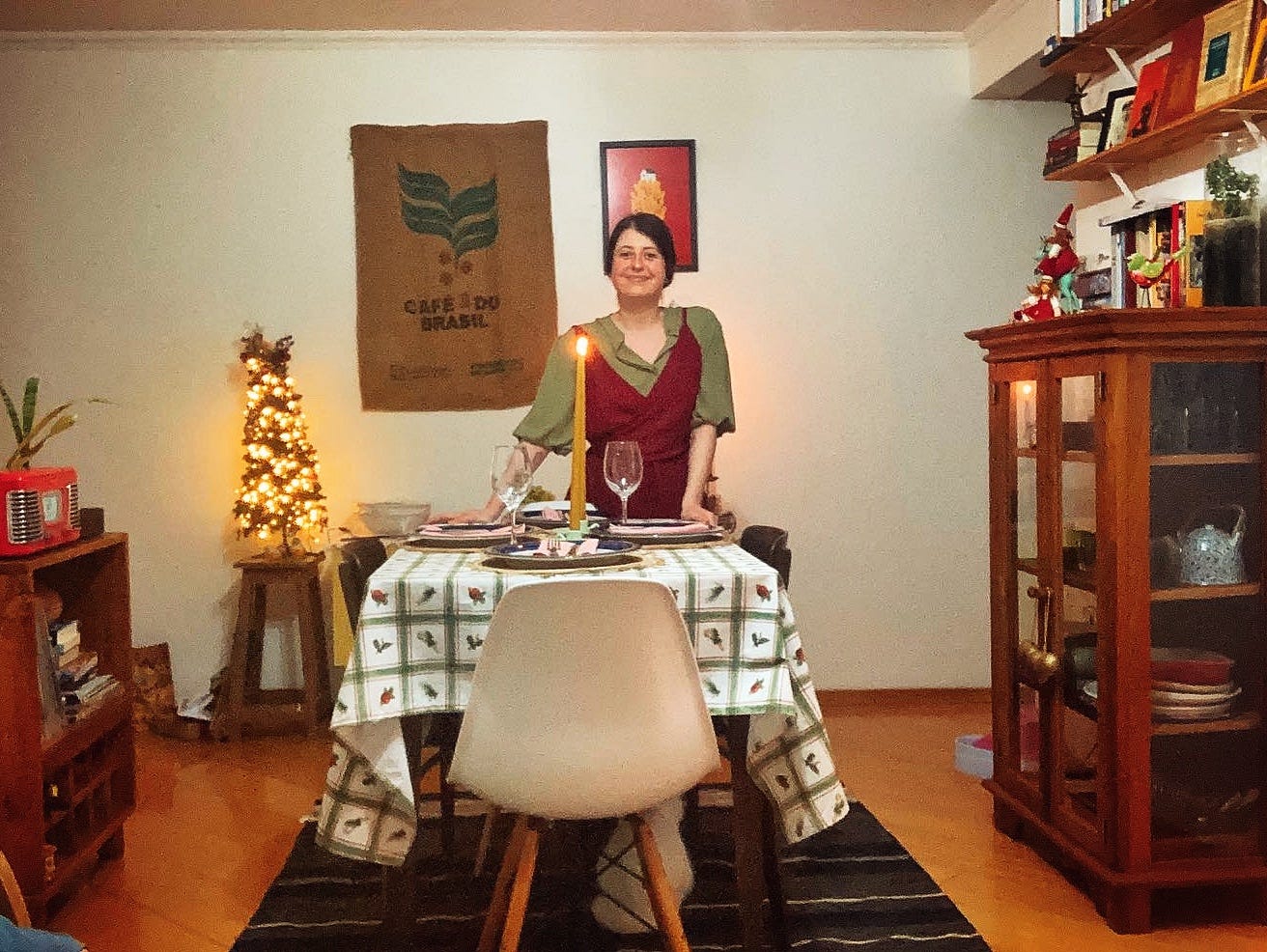less venlafaxine in my body, more dirty dishes in the sink
the last 2021's issue is here: shorter, a bit melancholy, and a preview of two themes for future essays
clique aqui para ler em português
I made this December an unusual month on purpose. Shorter than February when it comes to working days and collective efficiency, December accentuates my anxiety to the point that, for some years now, it has been the month when I need to double the dose of my antidepressant to maintain a minimum emotional balance. This year, I wanted to change another part of the equation and I got fewer jobs to reduce the number of tight deadlines that always accumulate in the first half of December. I had to give up a lot of things, but for the first time in six years, I didn't have to increase my antidepressant dose.
Earlier this month, I said that I wished I could spend less time at the computer and so I did. I made my hands busy with something concrete: peel and chop vegetables; cut and season meat; wash, portion, and tear leaves. As a consequence of the free time I spaced out in my schedule, I cooked much more than in the previous months and shared some of the extra portions with my brother, which is also my neighbor. For almost two weeks I packed lunch for him and got into a looping of reasons to-forget-the-computer-for-a-while. It worked. I made béchamel sauce with bacon and broccoli to serve with pasta; steak with onions and slightly crunchy and spicy potatoes; pork chops with laurel and carrots; chicken pancakes; creamy rice with shredded chicken and corn; and some more dishes I already forgot.
I felt the mood and curiosity I had as a teenager when miscooking was routine (as well as eating what got wrong). More than a decade later, I make fewer mistakes and get it right more often in first-attempts. In 2021 December, cooking became once again an energetic activity; from which I leave calmer and more excited. Less venlafaxine in my body, more dirty dishes in the sink.
So I was courageous enough to go back to the blog that inspired me in my first steps in the kitchen – not the everyday cooking, but something more. Even though I barely had access to sicilian lemon back in 2008 and thought it was obscene to use so much butter in a recipe, Technicolor Kitchen, from Patrícia Scarpin, is one of my first references. TK was presented to me by my lifetime friend Flora Refosco, and its pictures and how Pat explains the steps of the recipe and why she chose to combine those ingredients caused a huge impact on me. Just reading her blog taught me more than I can measure.
Two of TK's recipes were slightly adapted by me in the last weeks, and I prepared them more than once – that's how much I loved them. One was the pear, olive oil, and chocolate cake, in which I ignored the pear and added cocoa powder to the dough, and shredded white chocolate as a topping; and also made another version, in which I put garam masala in the dough, ignored the chocolate part and changed the pears to apples. The other one was brown butter brownies. I put a mix of nuts instead of only pecans and topped the dough with white chocolate so it caramelized when baking.

Cooking is an activity that interests me in many aspects, as you can tell by what I have published so far in my life. To be back at my beginning, such as the mood and to one of my great references, made me think about the culinary thinking.
I've made a draft with topics such as the starting point to imagine a meal (is it from a cut of meat? is it from a starchy ingredient? is it from the cooking point of a vegetable?); how we pick out ingredients from our preferences and preparation repertoire (and how this can form and rebuild throughout life as we are exposed to new practices); and how all of this changes over time due to external issues (the availability of ingredients, for example) and internal issues (such as mastery of a technique). I plan to talk to a few people before finishing the piece and publish it in one of the issues of this newsletter in the first quarter of 2022.
The unusualness of December was also due to the christmas dinner that this year was at my house. I made a four-day schedule to guide me in shopping and preparation, and ensure that on the 24th I only needed to cook the rice and roast the meat. We had a small board of cheeses, fruits, and nuts; festive rice that would serve well the two wings of the family (for those who eat everything, a mix with parsley, toasted almonds, and sicilian lemon zest to spice up the white rice); voluminous farofa with onion, carrot, and rosemary, prepared with lots of butter; a salad of leaves, tomatoes, and hearts of palm with slices of gala apple baked with little butter and sugar; two dressing options for the salad (mustard and honey; and soy sauce with ginger and garlic); and a dessert (the brown butter brownie I linked above, served with a homemade strawberry jam, and bought a gelato to finish off).
My parents brought the meat: a pork shank previously seasoned with garlic and onion powder from a slaughterhouse at Corupá, a small rural city in Santa Catarina near my hometown. I added laurel and fresh rosemary to the shank, and also sicilian lemon juice, olive oil, potatoes, and carrots. It yielded two meals for the four of us and a lunchbox for my brother.
Choosing the menu, running it without fuss, and hearing my parents and brother praise me positively surprised me. I didn't make bold choices – on the contrary: I walked very close to the basics – but I also didn't expect them to eat with such enthusiasm. Unlike curiosity, a quality that has accompanied me for decades, the satisfaction of serving was unknown to me on this magnitude.
I have never seen myself playing this role of hostess exemplary. Preparing the christmas dinner steeped in meaning and memories was a rite of passage, and sharing it with my family was one of the powerful experiences I had this year.
In between preparations, I've sketched a series of notes about being a host, which I plan to write in the coming months after talking to people much more spontaneous and experienced in receiving people at their houses than I am. Let's see if I can capture the complexity of the whole thing.
All this to say that there is no essay on this December 31st – not because of free time (which was plenty, but who would have time to read so much?), but due to the anguish that always haunts me in this hot month of summer and deadlines. After all, this December, despite being atypical, remains inevitable.
WE'LL SEE EACH OTHER (LITERALLY) IN JANUARY
Newsletter supporters will start the year with a virtual appointment.
On Wednesday, January 26th, at 7 PM, we will make a video call to get to know each other and comment on some topics already covered in this newsletter's pieces. The idea for this first meeting is to understand what interests and intrigues each of you, and also what you disagree with or what you would like to point out.
Invitations for this meeting will be sent on January 20th to supporters of the monthly (R$10) or annual (R$100) plan (at the current conversion it would be equivalent to US$ 2 a month or US$ 20 a year). Those who supported this newsletter during 2021 or want to start supporting from January 2022 will also receive an invitation to participate in the video call.
If you are viewing this issue through the Substack page and not in your inbox, you will not be able to read the public acknowledgments that are posted at the bottom of each issue. I copy them here so you all can see:
Thanks to Antônio Senkovski, Cristal Muniz, Fernanda Farias, João Frey, Jo Bulla, Jussara Voss, Kate McDermott, Laura Mingoti, Mariana Ceccon, Murilo Bomfim and Pat Willard for their support.
fogo baixo/low heat is a newsletter written by journalist Flávia Schiochet, translated by Luciane Maesp (except this one you just read, I translated it myself), and illustrated by Marina Kinas. All essays, interviews, and extra issues will always be available for free and you can read (or re-read) them by accessing the newsletter archive. Help spread the word:








Beautiful writing, Flavia, and your cake and table look lovely! Wishing you all good things in the New Year! 🤗 ❤️
One of this year's joys have been discovering your writing. Thank you!